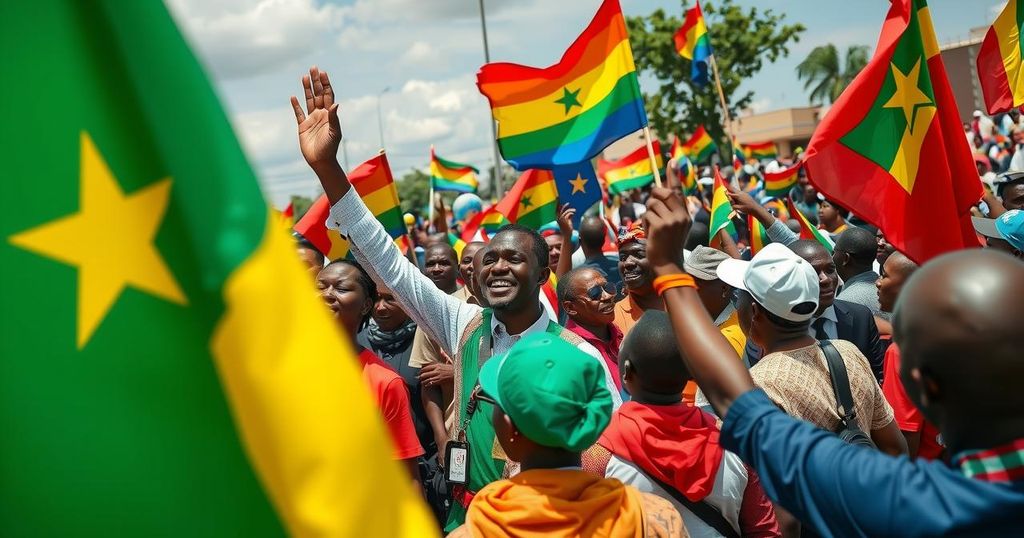Senegal’s Elections: A Triumph for Democratic Resilience
Senegal’s legislative election on November 17 marked a significant moment for democracy, showcasing high voter engagement and a peaceful transition of power to opposition leader Bassirou Diomaye Faye. This election is seen as a reaffirmation of democratic values amidst previous unrest triggered by former President Macky Sall’s controversial decisions. The results signal a commitment to constitutional governance despite ongoing challenges such as corruption and weak political institutions.
Senegal recently conducted a snap legislative election on November 17, following a period of political instability that began with former President Macky Sall’s decision to postpone the scheduled presidential election. The subsequent mass protests highlighted the existing fragility within Senegal’s democratic framework. However, the election, won by opposition figure Bassirou Diomaye Faye, reflects a significant commitment to democratic principles and constitutional governance. Voter participation was notably high, indicating a robust engagement from the populace in their governance. The peaceful transition of power from Sall to Faye underscores Senegal’s resilience in the face of political adversity. The elections were framed by promises of fairness and transparency, and the final results suggest that the ruling party, Pastef, is likely to secure a majority in the legislature. The congratulatory messages from former opposition leaders, including Sall himself, indicate a collective resolve to uphold Senegal’s democratic processes and institutions. Despite these positive outcomes, Senegal’s democracy is not without challenges. Persistent issues such as corruption, weak governance, and state capture undermine the political landscape. Although Senegal performs relatively well compared to its West African neighbors, practices like clientelism have hindered effective governance historically. To combat these challenges, Faye’s administration has pledged to introduce transparency and break away from past governance practices. Senegal’s stability is a noteworthy contrast to other African nations contending with democratic breakdowns. The country’s periodic elections and peaceful transitions have fostered an environment that eschews military interventions and maintains social consensus across diverse communities. Looking ahead, it is crucial for Senegal’s leaders to adhere to term limits and ensure inclusive political participation to maintain public trust in governmental institutions. Key recommendations for consolidating democracy in Senegal involve enhancing judicial independence, ensuring electoral integrity, and fostering an informed citizenry through education and civic engagement. Lessons from Ethiopia’s electoral successes and Ghana’s peaceful power transitions can provide frameworks for Senegal as it seeks to solidify its democratic foundations. Ultimately, the recent elections are a testament to the engagement of Senegalese citizens and reaffirm the importance of democratic processes in achieving political stability. Amidst growing public discontent over economic challenges and political representation, the effective management of corruption and misuse of power will be critical to Senegal’s ongoing democratic journey. Through inclusive governance and adherence to democratic principles, Senegal can fortify its institutional integrity and provide a model for neighboring nations striving for stability and democratic governance.
Senegal’s recent snap legislative elections were held against a backdrop of political uncertainty and civil unrest, stemming from former President Macky Sall’s controversial postponement of presidential elections. This decision led to widespread protests that revealed the vulnerabilities within Senegal’s democratic institutions. Following pressure from the population and opposition, democratic principles were reinforced through free and fair elections that showcased the citizens’ commitment to shaping their political landscape through legal means.
In conclusion, Senegal’s snap legislative election represents a significant milestone in the nation’s democratic journey. The peaceful transition to President Bassirou Diomaye Faye and the commendable voter turnout are indicators of a resilient democratic ethos among Senegalese citizens. However, the country must remain vigilant against challenges such as corruption and weak governance to maintain its democratic integrity and sustain public trust. By learning from past electoral challenges and prioritizing inclusive governance, Senegal can continue on its path of stability and democratic progress.
Original Source: theconversation.com




Post Comment